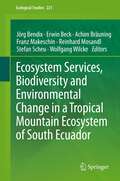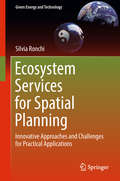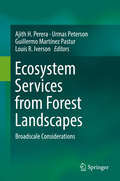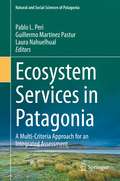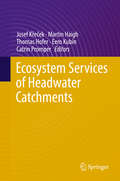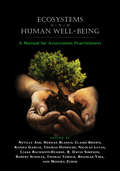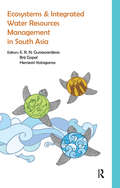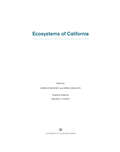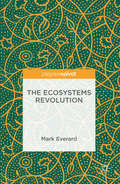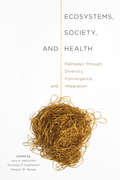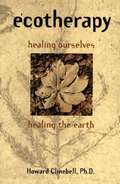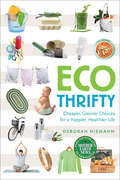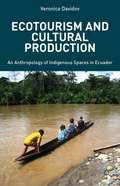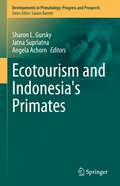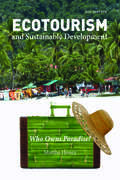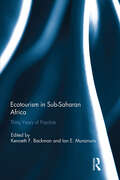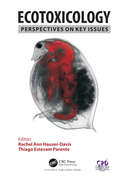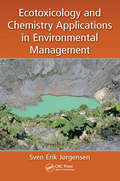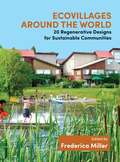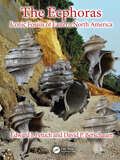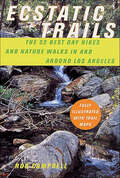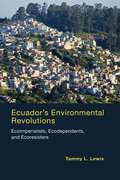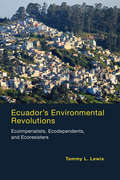- Table View
- List View
Ecosystem Services, Biodiversity and Environmental Change in a Tropical Mountain Ecosystem of South Ecuador
by Achim Bräuning Erwin Beck Franz Makeschin Jörg Bendix Reinhard Mosandl Stefan Scheu Wolfgang WilckeAn interdisciplinary research unit consisting of 30 teams in the natural, economic and social sciences analyzed biodiversity and ecosystem services of a mountain rainforest ecosystem in the hotspot of the tropical Andes, with special reference to past, current and future environmental changes. The group assessed ecosystem services using data from ecological field and scenario-driven model experiments, and with the help of comparative field surveys of the natural forest and its anthropogenic replacement system for agriculture. The book offers insights into the impacts of environmental change on various service categories mentioned in the Millennium Ecosystem Assessment (2005): cultural, regulating, supporting and provisioning ecosystem services. Examples focus on biodiversity of plants and animals including trophic networks, and abiotic/biotic parameters such as soils, regional climate, water, nutrient and sediment cycles. The types of threats considered include land use and climate changes, as well as atmospheric fertilization. In terms of regulating and provisioning services, the emphasis is primarily on water regulation and supply as well as climate regulation and carbon sequestration. With regard to provisioning services, the synthesis of the book provides science-based recommendations for a sustainable land use portfolio including several options such as forestry, pasture management and the practices of indigenous peoples. In closing, the authors show how they integrated the local society by pursuing capacity building in compliance with the CBD-ABS (Convention on Biological Diversity - Access and Benefit Sharing), in the form of education and knowledge transfer for application.
Ecosystem Services for Spatial Planning: Innovative Approaches and Challenges for Practical Applications (Green Energy and Technology)
by Silvia RonchiThe book investigates the relationship between ecosystem services (ES) and spatial planning, and explores potential means of integrating the two concepts to support the decision-making process. In addition, it presents case studies demonstrating the outcomes, limitations, opportunities and further new developments in ES assessment/mapping for planning support. Then it describes the “Restart from Ecosystem Services” (RES) methodology, which is aimed at integrating ES into the planning process using an ecological balance, and at promoting new planning parameters for the transformation areas. RES ensures the inclusion of ES in planning processes using the incremental measures of limiting, mitigating and compensating soil sealing and land take process promoting operational strategies in applying it. The implementation of RES is associated with strategic environmental assessment and provides valuable support in the definition of strategies across the entire planning process, especially for the evaluation of alternative scenarios.
Ecosystem Services from Forest Landscapes: Broadscale Considerations
by Louis R. Iverson Guillermo Martínez Pastur Urmas Peterson Ajith H. PereraOver the last two decades, the topic of forest ecosystem services has attracted the attention of researchers, land managers, and policy makers around the globe. The services rendered by forest ecosystems range from intrinsic to anthropocentric benefits that are typically grouped as provisioning, regulating, supporting, and cultural. The research efforts, assessments, and attempts to manage forest ecosystems for their sustained services are now widely published in scientific literature. This volume focuses on broad-scale aspects of forest ecosystem services, beyond individual stands to large landscapes. In doing so, it illustrates the conceptual and practical opportunities as well as challenges involved with planning for forest ecosystem services across landscapes, regions, and nations. The goal here is to broaden the scope of land use planning through the adoption of a landscape-scale approach. Even though this approach is complex and involves multiple ecological, social, cultural, economic, and political dimensions, the landscape perspective appears to offer the best opportunity for a sustained provision of forest ecosystem services.
Ecosystem Services in Patagonia: A Multi-Criteria Approach for an Integrated Assessment (Natural and Social Sciences of Patagonia)
by Pablo L. Peri Guillermo Martínez Pastur Laura NahuelhualThis book aims to quantify and discuss how societies have directly and indirectly benefited from ecosystem services in Patagonia; not only in terms of provisioning and cultural services, but also regulating and supporting services. Patagonia, a region that stretches across two countries (ca. 10% in Chile and 90% in Argentina), is home to some of the most extensive wilderness areas on our planet. Natural grasslands comprise almost 30% of the Americas, including the Patagonian steppe, while Patagonian southern temperate forests are important for carbon sequestration and storage, play a pivotal role in water regulation, and have become widely recognized for their ecotourism value. However, profound changes are now underway that could affect key ecosystem functions and ultimately human well-being. In this context, one major challenge we face in Patagonia is that ecosystem services are often ignored in economic markets, government policies and land management practices. The book explores the synergies and trade-offs between conservation and economic development as natural landscapes and seascapes continue to degrade in Patagonia. Historically, economic markets have largely focused on the provisioning services (forest products, livestock) while neglecting the interdependent roles of regulating services (erosion and climate control), supporting services (nutrient cycling) and cultural services (recreation, local identity, tourism). Therefore, the present work focuses on ecosystem functions and ecosystem services, as well as on trends in biodiversity and the interactions between natural environments and land-use activities throughout Patagonia.
Ecosystem Services of Headwater Catchments
by Josef Křeček Martin Haigh Thomas Hofer Eero Kubin Catrin PromperThis book addresses the evaluation of environmental impacts and services identified in headwaters of different eco-zones around the world. It presents 24 papers selected from contributions to recent meetings of the European Forestry Commission Working Party on the Management of Mountain Watersheds, which is coordinated by the FAO (Food and Agriculture Organization of the United Nations). Through its biennial sessions and inter-session activities, the Working Party focuses on the continuous exchange of knowledge and experience between professionals in Europe and other regions of the world confronted with similar issues. The contributions have been updated and peer-reviewed, and the interdisciplinary team of authors includes experts from the fields of geography, hydrology, chemistry, biology, forestry, ecology and socio-economics. The participatory management of headwater catchments in Europe, Africa, America and Asia was the central theme of the articles, which were divided into four sessions: (1) Headwater Environment and Natural Resources, (2) Enhancing Environmental Services in Headwaters, (3) Environmental Services in the Changing World, and (4) New Challenges for Environmental Education and Active Citizenship. The practical applications shown in the book address the multi-resource concept. The book offers a unique and valuable resource for environmentalists, engineers, watershed planners and policymakers alike.
Ecosystems and Human Well-Being: A Manual for Assessment Practitioners (Five Volume Set Ser.)
by Thomas Tomich Monika Zurek Neville Ash Hernán Blanco Keisha Garcia Bhaskar ViraDesigned by a partnership of UN agencies, international scientific organizations, and development agencies, the Millennium Ecosystem Assessment (MA) is the most extensive study ever of the linkages between the world's ecosystems and human well-being. The goal of the MA is to establish the scientific basis for actions needed to enhance the contribution of ecosystems to human well-being without undermining their long-term productivity. With contributions by more than 500 scientists from 70 countries, the MA has proven to be one of the most important conservation initiatives ever undertaken, and the ecosystem services paradigm on which it is based provides the standard for practice. This manual supplies the specific tools that practitioners of the paradigm need in order to extend their work into the future. The manual is a stand-alone "how to" guide to conducting assessments of the impacts on humans of ecosystem changes. In addition, assessment practitioners who are looking for guidance on particular aspects of the assessment process will find individual chapters of this manual to be useful in advancing their understanding of best practices in ecosystem assessment. The manual builds on the experiences and lessons learned from the Millennium Ecosystem Assessment global and sub-global assessment initiatives, with chapters written by well-known participants in those initiatives. It also includes insights and experiences gained from a wider range of ecosystem service-focused assessment activities since the completion of the MA in 2005.
Ecosystems and Integrated Water Resources Management in South Asia
by E. R. N. Gunawardena; Brij Gopal; Hemesiri KotagamaThis book provides an ecosystem perspective in addressing the water resource management issues in the South Asian region. It argues that aspects such as sources of water, its distribution and users; land–water interrelations; drivers of change such as laws, policies and institutions; management of issues and technologies related to water supply; institutional set-up; economic instruments such as pricing, taxes, subsidies; and economics of ecosystem services are crucial. Climate changes, melting of glaciers and polar ice caps, rising sea level and the increased frequency of extreme events, have to be factored into integrated management of water resources. This book addresses some of these major issues related to aquatic ecosystems and focuses on three major aspects: (a) concepts related to ecosystems, ecosystem services and their linkages with water; (b) human impacts on ecosystems, particularly the aquatic ecosystems, and their assessment; and (c) the management, including policy, governance and economics. Comprising new theories, research and case studies, the book will be useful those concerned with water resource management – professionals, students and researchers.
Ecosystems of California
by Erika Zavaleta Harold MooneyThis long-anticipated reference and sourcebook for California's remarkable ecological abundance provides an integrated assessment of each major ecosystem type--its distribution, structure, function, and management. A comprehensive synthesis of our knowledge about this biologically diverse state, Ecosystems of California covers the state from oceans to mountaintops using multiple lenses: past and present, flora and fauna, aquatic and terrestrial, natural and managed. Each chapter evaluates natural processes for a specific ecosystem, describes drivers of change, and discusses how that ecosystem may be altered in the future. This book also explores the drivers of California's ecological patterns and the history of the state's various ecosystems, outlining how the challenges of climate change and invasive species and opportunities for regulation and stewardship could potentially affect the state's ecosystems. The text explicitly incorporates both human impacts and conservation and restoration efforts and shows how ecosystems support human well-being. Edited by two esteemed ecosystem ecologists and with overviews by leading experts on each ecosystem, this definitive work will be indispensable for natural resource management and conservation professionals as well as for undergraduate or graduate students of California's environment and curious naturalists.
The Ecosystems Revolution
by Mark EverardThis book explores humanity's relationship with the natural world throughout evolutionary history, and the need to reorient this onto a symbiotic basis. It integrates the themes of natural and artificial selection, the characteristics of historic 'revolutions', and directed versus random change. Inspiring community-based projects, mainly from the developing world, show how ecosystem regeneration uplifts human livelihoods in a positively reinforcing cycle, embodying lessons germane to co-creating a Symbiocene era wherein humanity's substantial influence (the Anthropocene) achieves increasing symbiosis with the natural processes shaping the former Holocene epoch. The Ecosystems Revolution provides practical, positive examples, highlighting the attainability of an 'ecosystems revolution'.
Ecosystems, Society, and Health: Pathways through Diversity, Convergence, and Integration
by Lars K. Hallström Nicholas P. Guehlstorf Margot W. ParkesThe modern world has created complex systems that have interrelated concerns. Ecosystems, Society, and Health presents new perspectives on how the challenges relating to these concerns must be examined, not as disparate political narratives, but as dynamic transformational stories that demand integrative systems of research, analysis, practice, and action. Struggles over healthy watersheds, diseases associated with environmental change, and public health impacts of unsafe food exemplify the demand for integrated understanding and action. Contributors argue that traditional science, power politics, and linear ideals of public policy are inadequate to address sustainability, justice, safety, and responsibility. Drawing from a series of case studies that range from nursing, to watershed management, to environmental health and risk communication, this collection strikes an informed balance between practical lessons and a sophisticated theoretical context with which to interpret them. Demonstrating the diverse contextual understanding demanded by today’s complex issues, Ecosystems, Society, and Health is a timely resource with guidance for practitioners, researchers, and educators.
Ecosystems, Society, and Health
by Margot W. Parkes Nicholas P. Guehlstorf Lars K. HallströmThe modern world has created complex systems that have interrelated concerns. Ecosystems, Society, and Health presents new perspectives on how the challenges relating to these concerns must be examined, not as disparate political narratives, but as dynamic transformational stories that demand integrative systems of research, analysis, practice, and action. Struggles over healthy watersheds, diseases associated with environmental change, and public health impacts of unsafe food exemplify the demand for integrated understanding and action. Contributors argue that traditional science, power politics, and linear ideals of public policy are inadequate to address sustainability, justice, safety, and responsibility. Drawing from a series of case studies that range from nursing, to watershed management, to environmental health and risk communication, this collection strikes an informed balance between practical lessons and a sophisticated theoretical context with which to interpret them. Demonstrating the diverse contextual understanding demanded by today’s complex issues, Ecosystems, Society, and Health is a timely resource with guidance for practitioners, researchers, and educators.
Ecotherapy: Healing Ourselves, Healing the Earth
by Robert AndersonHere is a trailblazing book on issues of vital interest to the future of humankind. Ecotherapy: Healing Ourselves, Healing the Earth sheds light on humankind’s most serious health challenge ever--how to save our precious planet as a clean, viable habitat. As a guide for therapists, health professionals, pastoral counselors, teachers, medical healers, and especially parents, Ecotherapy: Healing Ourselves, Healing the Earth highlights readers’strategic opportunities to help our endangered human species cope constructively with the unprecedented challenge of saving a healthful planet for future generations. <p><p> Ecotherapy: Healing Ourselves, Healing the Earth introduces readers to an innovative approach to ecologically-grounded personality theory, spirituality, ecotherapy, and education. The book shares the author’s well-developed theories and methods of ecological diagnosis, treatment, and education so professionals and parents, our most influential teachers, can rise to the challenge of saving our planet. <p> A systematic theory and practice guidebook, Ecotherapy: Healing Ourselves, Healing the Earth fills a wide gap in both the counseling and therapy literature and the ecology literature. It offers an innovative model for fulfilling the “ecological circle” between humans and nature with three action dimensions. These are self-care by being intentionally nurtured by nature; spiritual enrichment by enjoying the transcendent Spirit in nature; and responding by nurturing nature more responsibly and lovingly. <p> The theories and practical applications presented in the book come together to explore long-overlooked issues at the boundary between human health and the health of the natural environment. Psychotherapists, health professionals, and teachers; pastoral counselors and other clergy who counsel and teach; laypersons who are parents and grandparents; and individuals and groups interested in environmental issues will find Ecotherapy: Healing Ourselves, Healing the Earth essential for approaching the long-neglected earthy roots of the total human mind-body-spirit organism.
Ecothrifty: Cheaper, Greener Choices for a Happier, Healthier Life (Mother Earth News Books for Wiser Living)
by Deborah NiemannUse it up, wear it out, make it do, or do without--our grandmothers knew the importance of responsible, thrifty choices. But somewhere along the way we lost our way and succumbed to the belief that we can get everything for next to nothing, have it shipped halfway around the world and then, more often than not, just throw it away. This consumer binge is taking its toll. Diet and lifestyle-related illnesses are epidemic, our environment is awash in a sea of plastic, our climate is changing, and the cost of everything is skyrocketing with the price of oil. Are we doomed? No. We can make greener, healthier choices, and we can do it while saving money. Where to start? Ecofrugal is packed with simple, practical ideas and recipes to help you: Make homemade products for cleaning and skin care Grow your own food and cook more from scratch Raise your family without lowering your standards A must-read for anyone who has ever wanted to live a greener life but thought that it would be too expensive, time-consuming, or difficult, this handy, complete guide will show you how small changes can have a huge environmental impact and save you thousands of dollars, all while improving your quality of life. Deborah Niemann is a homesteader, writer, and self-sufficiency expert. The author of Homegrown and Handmade: A Practical Guide to More Self-Reliant Living, she presents extensively on topics including soapmaking, breadbaking, cheesemaking, composting, and homeschooling.
Ecotopia 2121: A Vision for Our Future Green Utopia?in 100 Cities
by Alan MarshallA 2016 Green Book Festival "Future Forecasts" WinnerA stunningly original, lushly illustrated vision for a Green Utopia, published on the 500th anniversary of the original Big Idea.Five hundred years ago a powerful new word was unleashed upon the world when Thomas More published his book Utopia, about an island paradise far away from his troubled land. It was an instant hit, and the literati across Europe couldn't get enough of its blend of social fantasy with a deep desire for a better world. Five hundred years later, Ecotopia 2121 once again harnesses the power of the utopian imagination to confront our current problems, among them climate change, and offer a radical, alternative vision for the future of our troubled planet.Depicting one hundred cities around the globe-from New York to San Francisco, London, Tokyo, Sydney, Rio de Janeiro, Mexico City, Beijing, Vienna, Singapore, Cape Town, Abu Dhabi, and Mumbai-Alan Marshall imagines how each may survive and prosper. A striking, full-color scenario painting illustrates each city. The chapters tell how each community has found either a social or technological innovation to solve today's crises. Fifteen American cities are covered. Around the world, urban planners like to tailor scenarios for the year 2020, to take advantage of the metaphor of 20-20 vision. In Ecotopia 2121, the vision may be fuzzy, but its sharp insights, captivating illustrations, and playful storytelling will keep readers coming back again and again.
Ecotourism And Cultural Production
by Veronica DavidovEcotourism is a unique facet of globalization, promising the possibility of reconciling the juggernaut of development with ecological/cultural conservation. Davidov offers a comparative analysis of the issue using a case study of indigenous Kichwa people of Ecuador and their interactions with globalization and transnational systems.
Ecotourism and Indonesia's Primates (Developments in Primatology: Progress and Prospects)
by Sharon L. Gursky Jatna Supriatna Angela AchornThe basic goal of the volume is to compile the most up to date research on the effect of ecotourism on Indonesia’s primates. The tremendous diversity of primates in Indonesia, in conjunction with the conservation issues facing the primates of this region, have created a crisis whereby many of Indonesia’s primates are threatened with extinction. Conservationists have developed the concept of “sustainable ecotourism” to fund conservation activities. National parks agencies worldwide receive as much as 84% of their funding from ecotourism. While ecotourism funds the majority of conservation activities, there have been very few studies that explore the effects of ecotourism on the habitat and species that they are designed to protect. It is the burgeoning use of “ecotourism” throughout Indonesia that has created a need for this volume where the successes and pitfalls at various sites can be identified and compared.
Ecotourism and Sustainable Development, Second Edition: Who Owns Paradise?
by Martha HoneyEcotourism and Sustainable Development is the most comprehensive overview of worldwide ecotourism available today, showing how both the concept and the reality have evolved over more than twenty-five years. Here Martha Honey revisits six nations she profiled in the first edition--the Galapagos Islands, Costa Rica, Tanzania, Zanzibar, Kenya, and South Africa--and adds a fascinating new chapter on the United States. She examines the growth of ecotourism within each country's tourism strategy, its political system, and its changing economic policies. Her useful case studies highlight the economic and cultural impacts of expanding tourism on indigenous populations as well as on ecosystems.
Ecotourism in Sub-Saharan Africa: Thirty Years of Practice
by Kenneth F. Backman Ian E. MunanuraSince its first mention in the academic literature, ecotourism has been endorsed by NGOs and governments as the most environmentally sound and locally beneficial method of tourist development. Over the last thirty years sub-Saharan Africa has adopted ecotourism as the primary focus for tourism development; research into this has demonstrated mixed results. In this publication, we seek to explore the actual outcomes for African countries that have developed their tourism policy around the principals and values of ecotourism. The sheer scope and magnitude of the task means that a complete evaluation of ecotourism in Africa is impossible. Instead, included here are spot assessments of various aspects of ecotourism related to conservation, policy development, environment, governance, community and indigenous peoples in southern Africa. The studies cover a wide array of countries, including Botswana, Kenya, Tanzania, Uganda, Ghana, Zimbabwe, and South Africa. Though this is only the beginning of a needed long term evaluation of the positives and negatives of ecotourism, it provides a starting point from which to move forward. This book was originally published as a special issue of the Journal of Ecotourism.
Ecotoxicology: Perspectives on Key Issues
by Rachel Ann Hauser-Davis Thiago Estevam ParenteThis book presents an integrated discussion on ecotoxicology, containing both general concepts and specific ecotoxicological issues of major biological groups, extending beyond conventional systems. It explores worldwide, regional, and biocompartmentalized topics, bringing forth new points of view on global issues and addressing the increasing diversity and complexity of the ecotoxicological field. It also contains novel information on emerging contaminants, presents bioaccumulation effects on different levels of ecological organization and risk analyses, and discusses novel fields of methodological applications, including key aspects in ecotoxicological and environmental monitoring studies.
Ecotoxicology and Chemistry Applications in Environmental Management (Applied Ecology and Environmental Management)
by Sven Erik JorgensenEcotoxicology and Chemistry Applications in Environmental Management describes how to set up an integrated, holistic approach to addressing ecotoxicological problems. It provides detailed explanations in answer to questions like "Why is it necessary to apply an integrated approach?" and "How does one apply an integrated environmental management approach?" Highlighted topics of the book include Environmental chemical calculations QSAR estimation methods Toxic substance interference with other environmental problems Using diagnostic ecological subdisciplines for solutions Cleaner production methods and technologies Environmental risk assessment Addressing one of the most difficult tasks today, this book provides a much-needed holistic view for translating scientific knowledge and research results into effective environmental management measures. Rooted in a seven-step method, it integrates examination and quantification of an environmental problem and describes the use of ecological diagnostic tools to develop a diagnosis for ecosystem health. It also presents methods for choosing and using solutions or combinations of solutions to tackle problems.
Ecovillages around the World: 20 Regenerative Designs for Sustainable Communities
by Frederica Miller<p>Aligning perfectly with the practices of ecovillages around the world, these initiatives show that ecovillages and sustainable communities are leading by example as we move into a future focused on partnership, environmental protection, prosperity, and peace for all life and the planet we live on. <p>Offering a visual tribute to the work ecovillages do to alleviate climate change, social conflict, and environmental damage, including more than 300 full-color photographs, maps, and diagrams, this beautiful book highlights 20 best practice designs from ecovillages around the world to show how we can live lightly on the planet no matter where on earth we live, in all climate zones and cultures. It demonstrates how ecovillages have already achieved the climate goals all of us are now striving toward through practical lifestyle changes that promote peaceful and joyful coexistence both among people and between people and nature. Far from being only aesthetic choices, these changes give an increased quality of life, healthy homes, delicious organic food, playful interdependence, a new spiritual connection to our living planet, and much more. Through their regenerative, sustainable, and peace-promoting practices, ecovillages continue the culture of traditional village living in a modern way that addresses the critical challenges of our time. <p>The book features the following 20 ecovillage projects: Hurdal Ecovillage and Hurdal Sustainable Valley, Norway; Svanholm, Denmark; Permatopia, Denmark; Solheimar, Iceland; Lilleoru, Tallin, Estonia; Findhorn, Scotland; Sieben Linden, Germany; Tamera, Portugal; Damanhur, Italy; Torri Superiore, Italy; Kibbutz Lotan, Israel; Sekem, Egypt; Chololo, Tanzania; Tasman Ecovillage, Australia; Narara, Australia; Hua Tao Ecovillage, China; Auroville, India; Ecovillage at Ithaca, New York, USA; Huehuecoyotl, Mexico; Ceo do Mapia, Brazil.
The Ecphoras: Iconic Fossils of Eastern North America
by Edward J. Petuch David P. BerschauerIn the Miocene and Pliocene fossil shell beds of the eastern United States, the single most spectacular molluscan species radiation is seen in the ecphora shells (the Tribe Ecphorini). These bizarrely shaped gastropods, with their distinctive ribbed shell sculpture, represent a separate branch of the Subfamily Ocenebridae, Family Muricidae. Characteristically, these muricid gastropods are heavily ornamented with spiral ribs and cords and are considered some of the most beautiful and interesting groups of fossil mollusks found along the Atlantic Coastal Plain and Floridian Peninsula. The ecphoras are greatly sought after by fossil collectors. The ecphora faunas, and their individual species and subspecies, are illustrated and described in detail, along with photographs of ecphora-bearing geological units and in-situ specimens. The authors list the 67 known species and subspecies that are recognized as valid, arranged by the eight genera and five subgenera that encompass these taxa.
Ecstatic Trails: The 52 Best Day Hikes and Nature Walks In and Around Los Angeles
by Rob CampbellLos Angeles is a hiker's perfect playground: from enchanted canyons to bountiful beaches, the range of terrain provides an almost endless variety of trails, vistas, and even weather conditions. Organized by level of difficulty, beginning with the most forgiving trails and building up to the toughest, Ecstatic Trails emphasizes the experience of the hike, guiding you to romantic hikes, trails that are right for children, thrill hikes, day trips you can build around a picnic, or intense paths perfect for solitary exploration.Everything a novice hiker or experienced trailblazer needs is here, including:--detailed maps--driving directions--restrictions, including whether dogs are permitted--the amount of time each hike is likely to take--featured elements and trail descriptionsFrom wildflower walks to dramatic waterfall treks, from sunset outings to trails that provide cool breezes in the midst of summer, Ecstatic Trails is packed with a year's worth of happy hiking.
Ecuador's Environmental Revolutions: Ecoimperialists, Ecodependents, and Ecoresisters
by Tammy L. LewisEcuador is biologically diverse, petroleum rich, and economically poor. Its extraordinary biodiversity has attracted attention and funding from such transnational environmental organizations as Conservation International, the World Wildlife Fund, and the United States Agency for International Development. In Ecuador itself there are more than 200 environmental groups dedicated to sustainable development, and the country's 2008 constitution grants constitutional rights to nature. The current leftist government is committed both to lifting its people out of poverty and pursuing sustainable development, but petroleum extraction is Ecuador's leading source of revenue. While extraction generates economic growth, which supports the state's social welfare agenda, it also causes environmental destruction. Given these competing concerns, will Ecuador be able to achieve sustainability? In this book, Tammy Lewis examines the movement for sustainable development in Ecuador through four eras: movement origins (1978 to 1987), neoliberal boom (1987 to 2000), neoliberal bust (2000 to 2006), and citizens' revolution (2006 to 2015).Lewis presents a typology of Ecuador's environmental organizations: ecoimperialists, transnational environmentalists from other countries; ecodependents, national groups that partner with transnational groups; and ecoresisters, home-grown environmentalists who reject the dominant development paradigm. She examines the interplay of transnational funding, the Ecuadorian environmental movement, and the state's environmental and development policies. Along the way, addressing literatures in environmental sociology, social movements, and development studies, she explores what configuration of forces -- political, economic, and environmental -- is most likely to lead to a sustainable balance between the social system and the ecosystem.
Ecuador's Environmental Revolutions: Ecoimperialists, Ecodependents, and Ecoresisters
by Tammy L. LewisAn account of the movement for sustainable development in Ecuador through four eras: movement origins, neoliberal boom, neoliberal bust, and citizens' revolution.Ecuador is biologically diverse, petroleum rich, and economically poor. Its extraordinary biodiversity has attracted attention and funding from such transnational environmental organizations as Conservation International, the World Wildlife Fund, and the United States Agency for International Development. In Ecuador itself there are more than 200 environmental groups dedicated to sustainable development, and the country's 2008 constitution grants constitutional rights to nature. The current leftist government is committed both to lifting its people out of poverty and pursuing sustainable development, but petroleum extraction is Ecuador's leading source of revenue. While extraction generates economic growth, which supports the state's social welfare agenda, it also causes environmental destruction. Given these competing concerns, will Ecuador be able to achieve sustainability? In this book, Tammy Lewis examines the movement for sustainable development in Ecuador through four eras: movement origins (1978 to 1987), neoliberal boom (1987 to 2000), neoliberal bust (2000 to 2006), and citizens' revolution (2006 to 2015).Lewis presents a typology of Ecuador's environmental organizations: ecoimperialists, transnational environmentalists from other countries; ecodependents, national groups that partner with transnational groups; and ecoresisters, home-grown environmentalists who reject the dominant development paradigm. She examines the interplay of transnational funding, the Ecuadorian environmental movement, and the state's environmental and development policies. Along the way, addressing literatures in environmental sociology, social movements, and development studies, she explores what configuration of forces—political, economic, and environmental—is most likely to lead to a sustainable balance between the social system and the ecosystem.
